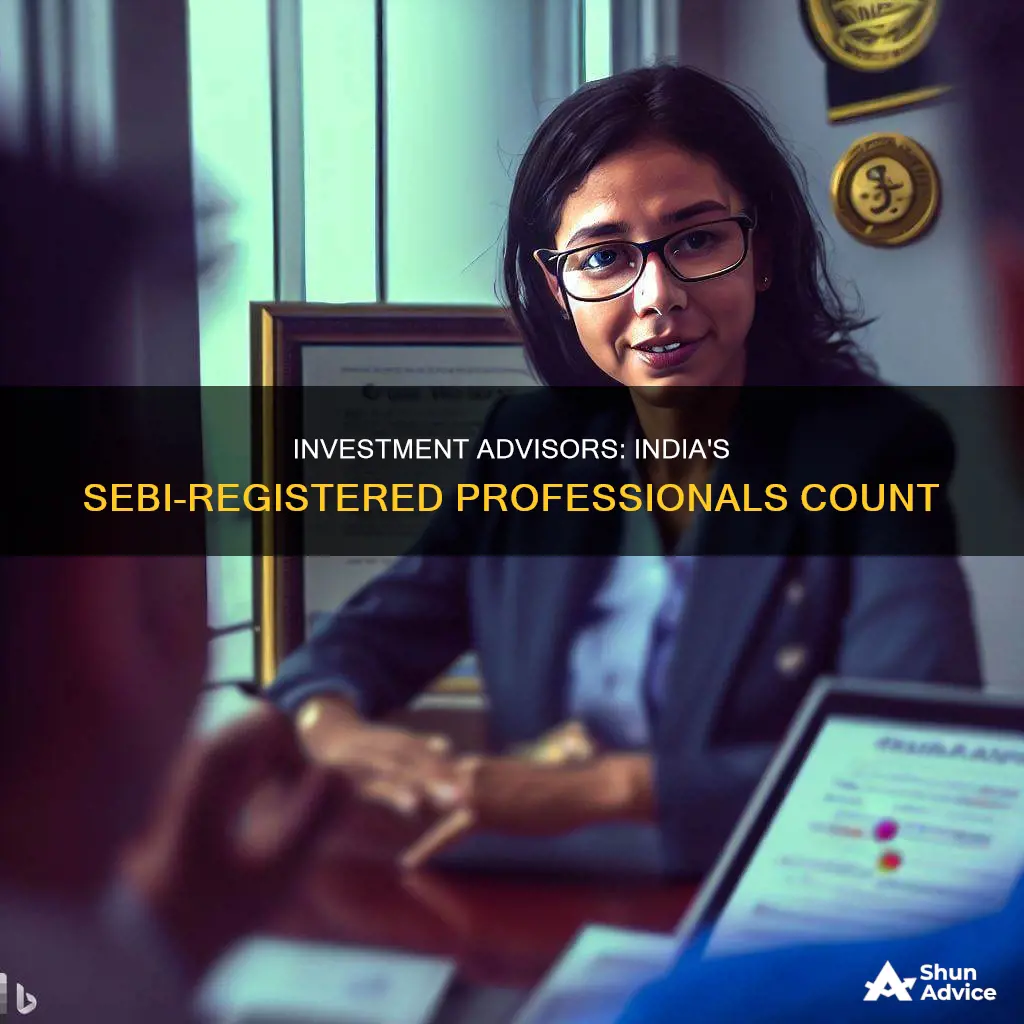
India has a low number of SEBI-registered investment advisors relative to the number of investors in the country. As of October 2021, there were 1,324 SEBI-registered investment advisors serving 2.75 crore mutual fund investors and 7.38 crore Demat account holders. This equates to a ratio of one investment advisor for every 76,510 investors. The stringent requirements for registration, including high educational qualifications and extensive work experience, have been a barrier for many potential advisors.
| Characteristics | Values |
|---|---|
| Number of SEBI-registered investment advisors (as of September 28, 2021) | 1,321 |
| Number of SEBI-registered investment advisors (as of October 2021) | 1,324 |
| Number of SEBI-registered investment advisors (latest available data as of June 10, 2024) | 1,324 |
| Ratio of SEBI-registered investment advisors to investors | 1:76,510 |
| Number of Demat accounts in India (as of October 31, 2021) | 7.38 crore |
| Number of mutual fund investors in India (as of October 31, 2021) | 2.75 crore |
What You'll Learn

SEBI's stringent norms and qualifications
The Securities and Exchange Board of India (SEBI) enforces stringent norms and qualifications for investment advisors to obtain and maintain their registration. These requirements serve to protect investors and ensure ethical practices in the financial advisory sector. Here is an overview of SEBI's stringent norms and qualifications:
Educational Qualifications
SEBI requires investment advisors to possess a minimum educational qualification, such as a graduate degree in finance, economics, or business administration. Alternatively, they can have a professional qualification like a CA, CFA, or MBA. In addition, investment advisors must pass a certification examination conducted by the National Institute of Securities Markets (NISM) or another recognised organisation.
Experience Requirements
To become a registered investment advisor, individuals must have a minimum of five years of relevant experience in financial product guidance, securities, funds, assets, or portfolio management. This experience ensures that advisors have the necessary knowledge and expertise to provide sound investment advice.
Ethical Standards and Regulations
SEBI-registered investment advisors must adhere to strict regulations and ethical standards. They have a fiduciary duty to act in their clients' best interests and provide unbiased advice. Advisors are required to disclose all information about their investment products and services, including charges, and maintain detailed records of client transactions and interactions.
Infrastructure Requirements
In addition to educational and experience qualifications, applicants must also ensure they have adequate infrastructure to provide investment advisory services. This includes office space, furniture, equipment, communication tools, and market research software systems.
Registration Process
The registration process for investment advisors involves meeting the eligibility criteria, passing the NISM certification exam, and applying to SEBI through Form A, along with the necessary documents and an application fee. SEBI will review the application, and if approved, the advisor will receive a registration certificate and can begin offering advisory services.
Fee Structure
SEBI has introduced a fee mechanism to regulate the charges levied by registered investment advisors. There are two fee structures: 2.5% of Assets under Advice (AUA) per annum per family or INR 75,000 per annum per family.
Compliance and Investor Protection
SEBI places a strong emphasis on compliance with its regulations, including advertising and marketing, conflicts of interest, and client confidentiality. To enhance investor protection, SEBI introduces measures for transparency and accountability, such as mandatory disclosures about fees and conflicts of interest.
Michigan's Investment Management: Your Money, Your Future
You may want to see also

The number of SEBI-registered investment advisors
The Securities and Exchange Board of India (SEBI) regulates the registration of Investment Advisors (IAs) and has strict eligibility criteria for those who wish to become RIAs. As of September 28, 2021, there were 1,321 SEBI-registered investment advisors (RIAs) in India, according to SEBI data. However, this number includes those giving stock tips, and if those are excluded, there are only around 400 financial advisors in the country.
The low number of RIAs in India is partly due to SEBI's stringent norms on education and experience. All advisors must have a postgraduate qualification and at least five years of relevant work experience. They must also pass a certification examination and adhere to strict regulations and ethical standards.
SEBI's regulations for RIAs aim to protect investors from unethical practices and ensure they receive unbiased and efficient investment advice. The regulations include requirements for transparency in fees and charges, record-keeping, and client confidentiality.
The role of a SEBI RIA is to provide personalized investment advice to clients based on their financial goals, risk tolerance, and investment preferences. They also educate clients about various investment options, including the risks and potential returns, and help them build a well-diversified investment portfolio.
The fee structure for SEBI RIAs is regulated, with two options: 2.5% of Assets under Advice (AUA) per annum per family, or a flat fee of INR 75,000 per annum per family.
The process to become a SEBI-registered investment advisor involves meeting the eligibility criteria, passing the NISM certification exam, applying for SEBI registration, paying the application fee, and complying with SEBI regulations and ethical standards.
Adjusting Your Child's Future: Editing 529 Investment Portfolio
You may want to see also

The role of SEBI RIAs
The Securities and Exchange Board of India (SEBI) introduced Registered Investment Advisers (RIAs) in 2013 to uphold investor interests. RIAs are qualified professionals authorised to provide financial advisory services to clients. They are required to adhere to strict ethical standards, disclosure norms, and regulations set by SEBI.
SEBI RIAs play a crucial role in providing unbiased and personalised investment advice to their clients. They offer a range of services, including financial planning, investment management, retirement planning, and tax planning. Here are some key roles and responsibilities of SEBI RIAs:
- Providing Personalised Investment Advice: SEBI RIAs tailor their recommendations based on their clients' unique financial goals, risk tolerance, and investment preferences. They develop investment strategies aligned with their clients' objectives and provide ongoing support to help them stay on track.
- Educating Clients: SEBI RIAs educate their clients about various investment options, including the associated risks and potential returns. They help clients understand the nuances of investing in securities and market behaviour, enabling them to make informed investment decisions.
- Market Research and Analysis: SEBI RIAs conduct in-depth research on investment opportunities and provide clients with up-to-date information on market trends, industry developments, and investment strategies. This helps clients make timely and well-informed investment decisions.
- Portfolio Management: SEBI RIAs offer portfolio management services, assisting clients in building well-diversified investment portfolios that meet their specific needs and goals. They help clients navigate the complex financial market and make suitable investment choices.
- Compliance with Regulatory Requirements: SEBI RIAs are required to comply with the SEBI (Investment Advisers) Regulations, 2013. This includes maintaining client confidentiality, avoiding conflicts of interest, ensuring transparency in fees and charges, and proper record-keeping of client transactions and communications.
- Investor Education: In addition to providing investment advice, SEBI RIAs educate their clients about financial matters, empowering them to make better financial choices.
- Risk Mitigation: SEBI RIAs help clients understand and effectively manage investment risks. They guide clients through market fluctuations, promoting informed decision-making and peace of mind.
SEBI RIAs play a vital role in bridging the gap between investors and the complex financial market. By offering sound and personalised investment guidance, they help investors make well-informed decisions and achieve their financial goals.
Investment Management: Competitive or Cutthroat?
You may want to see also

Benefits of being a SEBI-registered investment advisor
As of 28 September 2021, there were 1,321 SEBI-registered investment advisors (RIAs) in India. However, this number includes those giving stock tips, so there are only about 400 financial advisors in the country.
Credibility
Being registered with SEBI enhances your credibility as an investment advisor. It shows that you have met the standards and requirements set by the regulatory body. This can help you attract more clients and expand your business.
Legal Compliance
SEBI-registered investment advisors must follow strict guidelines and comply with SEBI regulations, which help protect investors from unethical practices. This legal compliance ensures that you are providing advice in a manner that is fair and beneficial to your clients.
Business Expansion
SEBI registration allows you to offer various services, such as portfolio management and financial planning, which can attract a wider range of clients and help you expand your business. With SEBI registration, you can establish yourself as a trusted professional in the investment advisory field.
Professional Development
To maintain your SEBI registration, you must stay up to date with the latest industry trends and regulatory changes. This professional development ensures that you are always providing the best and most current advice to your clients.
Protection
SEBI provides a dispute resolution mechanism to help investors resolve conflicts with their advisors. This protection can give your clients peace of mind and further enhance your credibility.
Saving Relationships: Worth the Investment?
You may want to see also

How to find a SEBI-registered investment advisor
India's Securities and Exchange Board (SEBI) has strict requirements for those seeking to become a Registered Investment Advisor (RIA). As a result, there are only a few hundred RIAs in the country. However, if you are looking for a SEBI-registered investment advisor, here is a step-by-step guide to help you find one:
- Visit the SEBI website: The official SEBI website maintains a list of all registered investment advisors. You can search for your desired advisor by name and check for their SEBI registration number. This is a reliable way to verify the credentials of any investment advisor in India.
- Check with financial planning organisations: Another way to find a SEBI-registered investment advisor is to reach out to financial planning organisations. These organisations can provide you with referrals to reputable and qualified investment advisors.
- Get referrals from friends and family: Word-of-mouth referrals can be a great way to find a trusted investment advisor. Ask your friends and family if they have any recommendations or past experiences with SEBI-registered investment advisors.
- Verify credentials and experience: Once you have identified a potential investment advisor, it is essential to verify their credentials and level of experience. Check that they meet the minimum qualification and experience requirements set by SEBI, including relevant education and work experience.
- Understand their investment approach: Before engaging with an investment advisor, take the time to understand their investment philosophy and approach. A good investment advisor will focus on providing unbiased and personalised investment advice based on your financial goals, risk tolerance, and investment preferences.
- Review agreements: Agreements between clients and RIAs outline the terms and conditions of the services provided, including fees, scope of services, and the rights and responsibilities of both parties. Review these agreements carefully to ensure you understand the nature of the professional relationship.
- Look for transparency and ethical practices: SEBI-registered investment advisors are expected to adhere to strict regulations and ethical standards. Choose an advisor who demonstrates transparency in their practices and puts your interests first.
By following these steps, you can find a SEBI-registered investment advisor who meets your financial needs and provides trustworthy advice. Remember to do your due diligence and thoroughly research any potential advisor before engaging their services.
Savings and Investments: Strategies for Effective Money Allocation
You may want to see also
Frequently asked questions
As of October 2021, there were 1,324 SEBI-registered investment advisors in India.
As of October 2021, India's ratio of SEBI-registered investment advisors to investors was 1:76,510.
To become a SEBI-registered investment advisor in India, individuals must have a professional degree in finance, accounting, business management, or economics, as well as a postgraduate degree or five years of relevant work experience. They must also pass the NISM Series-X-A and X-B examinations.
SEBI-registered investment advisors provide personalized investment advice to clients based on their financial goals, risk tolerance, and investment preferences. They also educate clients about various investment options, conduct market research, and offer portfolio management services.
The list of SEBI-registered investment advisors is available on the SEBI website.







